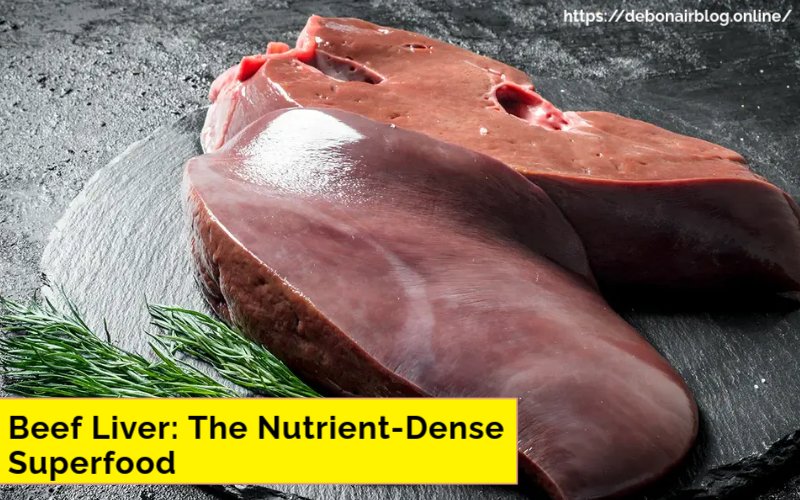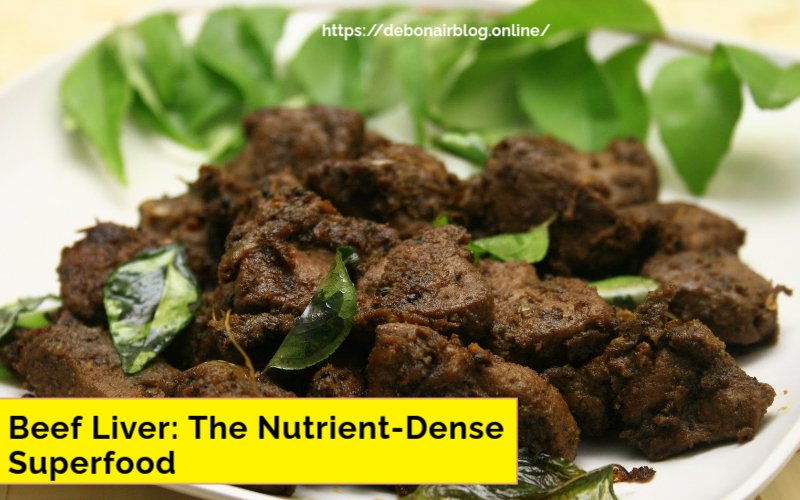
Beef Liver: The Nutrient-Dense Superfood for Every Diet in 2024
Table of Contents
Beef liver has long been celebrated as a powerhouse of nutrition, often hailed as a superfood. This remarkable organ meat is not only packed with essential vitamins and minerals but also offers a wealth of health benefits that can enhance any diet.
Whether you’re a health enthusiast or simply looking to add more nutrient-dense foods to your meals, It deserves a spot on your plate. Let’s dive into the world of beef liver and explore its nutritional profile, health benefits, cooking methods, and more.
Understanding Beef Liver: A Nutritional Powerhouse
When we talk about beef liver, we’re referring to the liver of cattle, specifically Angus beef in many cases. This organ meat is incredibly nutrient-dense, meaning it contains a high concentration of vitamins and minerals relative to its calorie content.
In fact, just a small serving of It can provide more than the daily recommended intake of several essential nutrients.
Nutritional Benefits of Beef Liver
It is rich in protein, making it an excellent choice for those looking to build muscle or maintain a healthy weight. A typical serving contains around 20 grams of protein, which helps repair tissues and supports overall bodily functions.
Additionally, beef liver is loaded with vitamins such as Vitamin A, B12, and folate, all crucial for energy production and maintaining optimal health.Moreover, the mineral content in beef liver is impressive. It’s particularly high in iron, which is essential for transporting oxygen in the blood.
The iron found in beef liver is heme iron, which is more easily absorbed by the body compared to non-heme iron found in plant sources. This makes it an ideal food for individuals who may be at risk for anemia.
What Makes Beef Liver a Superfood?
When we refer to beef liver as a superfood, we are highlighting its exceptional nutrient density. A small serving of beef liver can provide more vitamins and minerals than many fruits and vegetables combined. It’s rich in protein, low in calories, and contains a variety of essential nutrients that support overall health.
Nutritional Breakdown
A typical 3-ounce serving of beef liver contains approximately:
- Calories: 149
- Protein: 23 grams
- Fat: 4 grams
- Cholesterol: 310 milligrams
- Iron: 4.9 milligrams (27% of the Daily Value)
- Vitamin A: Over 100% of the Daily Value
- Vitamin B12: 2,917% of the Daily Value
These figures demonstrate the high nutritious content of cow liver. It is noteworthy for having an exceptionally high concentration of vitamin B12, which is essential for the synthesis of energy and the upkeep of healthy nerve cells.
The nutritional content of cow liver is one of its most notable qualities. For example, a tiny amount can supply more than 100% of your daily needs for Vitamin A, which is essential for healthy eyes and a strong immune system.
It’s also a great source of vitamin B12, which is necessary for the development of red blood cells and the health of the brain.
Minerals That Matter
In addition to vitamins, It is also rich in minerals like copper and zinc. Copper plays a crucial role in energy production and iron metabolism, while zinc supports the immune system and helps with wound healing. These minerals are often lacking in many diets, making beef liver an invaluable addition.

Health Benefits: More Than Just Nutrition
The health benefits of incorporating beef liver into your diet extend beyond its impressive nutritional profile. Regular consumption can lead to numerous positive outcomes for your overall well-being.
Boosting Energy Levels
Thanks to its high vitamin B12 content, eating beef liver can help combat fatigue and boost energy levels. B12 is essential for converting food into energy and maintaining healthy nerve cells. If you often feel tired or sluggish, adding this superfood might just do the trick.
Supporting Immune Function
With its wealth of vitamins and minerals, particularly zinc and Vitamin A, beef liver plays a significant role in supporting your immune system. These nutrients help your body fight off infections and maintain overall health.
If like this article so far you may like this Tallow and it’s benefits
Cooking Methods: How to Enjoy Beef Liver
While some might shy away from cooking with organ meats due to their unique flavor, there are countless ways to prepare beef liver that make it delicious and enjoyable.

Classic Recipes
One popular method is pan-frying beef liver with onions—a classic dish that many love. Simply marinate sliced liver in vinegar or lemon juice to enhance its flavor before cooking it quickly on high heat with caramelized onions.
Incorporating into Other Dishes
If you’re still hesitant about the taste of beef liver, consider incorporating it into other recipes like spaghetti bolognese or meatloaf. By mincing the liver and mixing it with ground beef or other meats, you can enjoy its nutritional benefits without being overwhelmed by its flavor.
Risks: Moderation is Key
Despite its many benefits, there are some risks associated with consuming beef liver that should not be overlooked.
Vitamin A Toxicity
One major concern is the high level of Vitamin A found in beef liver. While this vitamin is essential for health, excessive intake can lead to toxicity. Symptoms may include nausea, headaches, dizziness, and even more severe health issues if consumed in large quantities over time.
Copper Overload
It is also rich in copper; while this mineral is important for various bodily functions, too much copper can lead to toxicity as well. It’s crucial to consume beef liver in moderation—generally recommended at about once a week—to avoid these potential risks.
Dietary Guidelines: Who Should Be Cautious?
While many people can safely enjoy beef liver as part of their diet, certain groups should exercise caution.
Pregnant Individuals
Pregnant women should be particularly careful with their intake of beef liver due to its high Vitamin A content. High doses can potentially lead to birth defects; thus, moderation or avoidance may be advisable during pregnancy.
Those with Gout
Individuals suffering from gout should also limit their consumption of organ meats like beef liver because they are high in purines. High purine levels can elevate uric acid levels in the blood, leading to painful gout attacks.
Real-Time Case Study: Transforming Health with Beef Liver
To illustrate the benefits of incorporating beef liver into one’s diet, let’s look at Sarah’s story—a busy mom who struggled with fatigue and low energy levels due to her hectic lifestyle.After consulting with a nutritionist who recommended adding nutrient-dense foods like beef liver into her meals, Sarah decided to give it a try.
She started cooking small portions once a week alongside her family’s favorite dishes—like stir-fried vegetables and rice.Within weeks, Sarah noticed a significant boost in her energy levels; she felt more alert throughout the day and was able to keep up with her kids’ activities without feeling exhausted.
Not only did she enjoy the health benefits herself but her family also loved the dishes she prepared featuring this superfood!
FAQs
Can cats eat boiled beef liver?
Yes! Cats can eat boiled beef liver in moderation as it provides essential nutrients; however, it should not be their primary food source due to its richness.
Is beef liver good for you?
Absolutely! It is packed with nutrients that support overall health when consumed in moderation.
Can you eat boiled beef liver?
Yes! Boiled or cooked beef liver can be enjoyed safely; just ensure it’s cooked thoroughly to avoid any foodborne illnesses.
What are the key nutrition facts about beef liver?
It typically contains around 133 calories per 100 grams along with 20 grams of protein and significant amounts of vitamins A and B12.
How often should you eat beef liver?
Moderation is key; consuming it once a week is generally recommended for most people to reap its benefits without risking toxicity.
What are some cooking methods for preparing fresh liver?
You can pan-fry it with onions or incorporate it into dishes like meatballs or casseroles to mask its distinct flavor while enjoying its nutrients.
Is grass-fed liver better than conventional?
Grass-fed options may contain higher levels of omega-3 fatty acids and other beneficial nutrients compared to conventionally raised animals.
What are the risks associated with eating too much organ meat?
Excessive consumption can lead to vitamin A toxicity or copper overload; it’s important to balance organ meats within your overall diet.
How does cooking affect the nutritional value of beef liver?
Cooking methods like boiling or frying may reduce some water-soluble vitamins but generally preserve most nutrients when done correctly.
Can children eat beef liver?
Yes! Children can benefit from small amounts of cooked beef liver as part of a balanced diet but should consume it less frequently than adults due to higher vitamin A levels.
Are there any alternatives if I dislike the taste of beef liver?
If you’re not fond of the flavor, consider supplements or try milder organ meats like chicken livers instead.
What should I look for when buying premium beef liver?
Opt for fresh or frozen options from reputable sources; grass-fed varieties are often preferred for their superior nutrient profile.
Conclusion:
In conclusion, beef liver stands out as a nutrient-dense superfood, offering an array of vitamins and minerals that contribute positively to our health. With proper preparation methods and mindful consumption practices, anyone can enjoy this remarkable food while reaping its numerous benefits. So why not give it a try? Your body will thank you!

